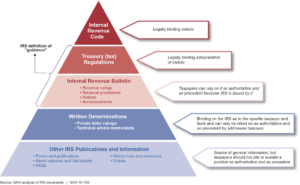The Internal Revenue Service (IRS) issues many forms of public and private guidance, both to government personnel and to taxpayers. Litigation Guideline Memorandums (LGMs) are one such type of guidance, and were issued by the IRS Office of Chief Counsel through 1999 to provide information and instruction relating to litigating procedures and method, and standards and criteria on issues and matters of significant interest to litigating attorneys in the Office of Chief Counsel. LGMs have been cited many times as evidence of the IRS’s position on a matter, and courts have ranged from citing LGMs as supporting authority to dismissing them as inconsistent with other IRS guidance and/or merely reflecting the IRS’s litigating position.
On November 2, 2016, the IRS announced in Office of Chief Counsel Notice CC-2017-001 that, to the extent existing LGMs have not been formally obsoleted or withdrawn, they may now be considered obsolete. However, the IRS recognized that LGMs can serve as useful tools and historical records of previous positions taken by the IRS in litigation, and that IRS attorneys seeking guidance on issues that were previously covered by an LGM should determine whether updated guidance has been provided or request advice from the IRS National Office. This indicates that LGMs may continue to be relevant for both taxpayers and IRS personnel in determining the IRS’s position on a particular issue.
read more

 Subscribe
Subscribe





